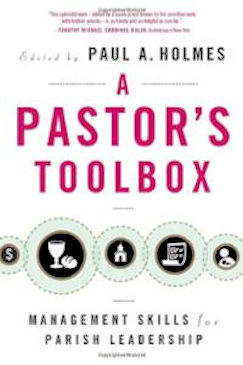
|
Posted June 11, 2014
Book: A Pastor's Toolbox: Management Skills for Parish Leadership Edited by: Paul A. Holmes Liturgical Press. Collegeville, MN. 2014. Pp. 179 An Excerpt from the Jacket:
Today's parish leaders are expected to be holy and prayerful spiritual guides, great preachers and compassionate confessors, but also to make important decisions in key areas like finance, budgeting, hiring and firing, fundraising, risk management, relationship-building and more --- often with virtually no transition or training. And with all the requisite education in philosophy and theology they must provide future pastors, in addition formation in priestly spirituality and pastoral care, seminaries can do little to prepare priests to deal with the difficult temporal issues pastors face. A Pastor's Toolbox is designed to help fill that void with valuable information, insights, and practical tools that pastors need in order to begin handling the complexities of parish management in the twenty-first century. It candidly addresses: --- hiring, evaluating, coaching, and inspiring members of your parish team --- budgeting and financial analysis --- working seamlessly with laity --- managing skills essential to fundraising --- protecting a parish's assets --- best practices to operate a parish effectively An Excerpt from the Book: I'd like to suggest that one of the things that a church does in terms of mission is to find ways to send people into the world from their experience of communion. "Go the mass is ended." How do we encourage and promote that mission-driven function within the Catholic Church? How do we move people from this experience of the divine into the world in which they live so they can be transformative? For most people, this opportunity will be realized by investing time and energy in worldly, secular institutions, like the corporation, the political party, the community organization, and within their own homes. But the church also creates expressions of justice and ecclesial models of service into the world. St. Pat's decided early on that it was going to try to eradicate poverty in the city of Chicago. And we settled on two ways of accomplishing that. One was traditional --- using education to lift people out of poverty. The school we created has been very successful in doing that. But there are other programs in which our young adults are involved that are working hard to move inner-city people from poverty to opportunity. They include mentoring and helping them find jobs. One powerful program helps about two hundred homeless people a year get jobs, with benefits, and take responsibility for their lives. We also have mission in Central America, Latin America, Africa, and Asia where we touch the lives of others. When I think in terms of the age of the laity, I realize what we're trying to do is listen to the hearts of people who really love the church, love the gospel, and want to do God's work in the world. How do we create a church model in which that energy, talent, creativity, and passion are unleashed? We can't do it through a top-down model. We have to break out of that traditional mold and realize that in the role of pastor we have this great opportunity to open up and unleash the energies of God's people in a way that really makes the Catholic Church a mission-driven forge. In sum, we must create experiences of church that help people deepen their sense of the presence and the mystery of their oneness with God. And with the gift of God's love and energy within them, they will choose to go out and live in mission to the world, communion and mission. Table of Contents: Introduction: Paul A. Holmes 1 A theology of management: why we do what we do 2 Pastoral leadership 3 A six-month game plan 4 Getting started: the parish business office 5 Developing a comprehensive human resources program 6 Risk management 7 Best practices in parish internal financial controls 8 Fundraising as Christian stewardship 9 Pastoring and administering a mission-driven church 10 Building councils 11 Standards for excellence 12 Parish planning 13 Unity and diversity 14 The pastor and the diocese 15 In pursuit of priestly well-being Appendix A: Performance improvement memo Appendix B: Total compensation Appendix C: Procedures of the office of conciliation, Archdiocese of St. Paul and Minneapolis |
|
